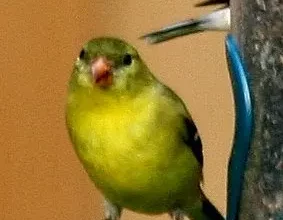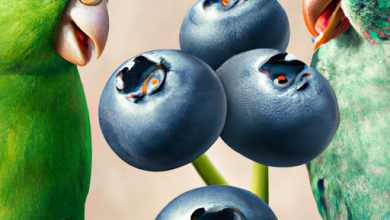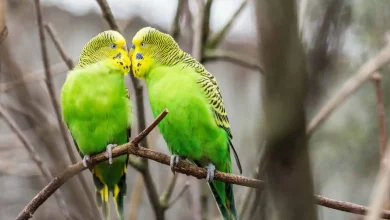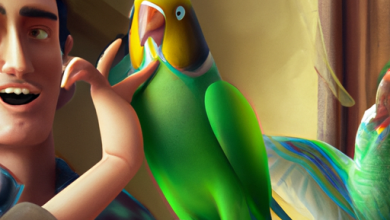Can Indian Ringnecks Eat Oranges? What You Need To Know
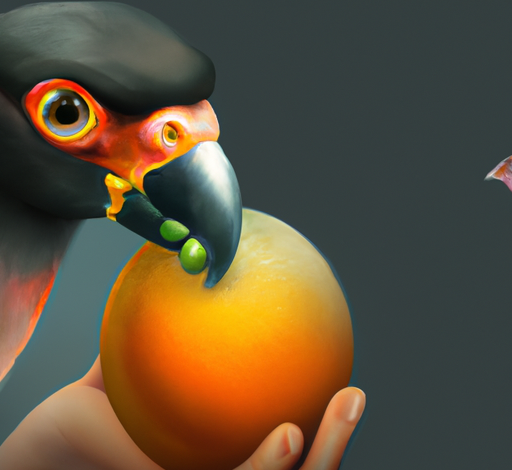

If you want to eat something incredibly nutritious and healthy, you can’t go wrong with having a piece of fruit, especially a refreshing slice of orange.
Filled to the brim with vitamins and nutrients, the famous citrus fruit is easily one of the most consumed fruits in the world, and anyone who has enjoyed one knows why.
But, on that note, can your pet Indian Ringneck also enjoy oranges?
The answer is yes, Indian Ringnecks can eat oranges. Oranges are excellent in giving your pet bird its share of essential supplements. However, since oranges are also very acidic, you should feed them in moderation to avoid any potential health issues.
Keep reading to learn more about oranges and their potential benefits for your feathered friend, as well as everything in between.
Can Indian Ringnecks Eat Oranges? Everything You Should Know
Indian Ringnecks are often well-known for being nippy and hard to tame. More than that, however, Indian Ringnecks are also parrots, which means that, like most of their species, they are also delicate animals regarding their eating regimen. Furthermore, they can also be demanding.
It’s also important to understand that out in the wild, Indian Ringnecks live in tropical environments where they have immediate access to flavorful citrus fruits like mandarins, tangerines, and clementines, among others.
That said, some are healthier than others, where oranges come into the picture. Rich in vitamins and nutrients, besides being tasty, oranges make for a healthy treat for domesticated pet birds like yours.
Like most fruits, however, specific reminders must be kept in mind when feeding these to your Indian Ringneck. This includes knowing what benefits are in that fruit, how much of that fruit you need to provide, and the potential dangers of overfeeding it to your pet.
Nutritional Benefits of Oranges for Indian Ringnecks
Oranges are a great source of nutrition for Indian Ringnecks, providing them with essential vitamins and minerals to keep them healthy and happy. Oranges are a great source of Vitamin C, which helps to boost the immune system and protect against disease. They also contain Vitamin A, which is important for vision and skin health, as well as B vitamins, which help with metabolism and energy production. Oranges are also a good source of fiber, which helps to keep the digestive system healthy.
Oranges are an excellent source of antioxidants, which help to combat the damage caused by free radicals in the body. These antioxidants can help to protect against cancer, heart disease, and other age-related diseases. Oranges are also a good source of potassium, which helps to regulate blood pressure and keep the heart healthy.
Indian Ringnecks can benefit from eating oranges in several ways. The Vitamin C in oranges helps to keep their feathers looking shiny and healthy. The Vitamin A helps them to see better in low light conditions. The B vitamins help with energy production, which is important for active birds. The fiber helps to keep their digestive systems running smoothly and the antioxidants help to protect against disease.
Overall, oranges are a great nutritional option for Indian Ringnecks. They provide essential vitamins and minerals that help to keep them healthy and happy. Oranges are a tasty treat that can be enjoyed by your bird on a regular basis.
Identifying Safe Orange Varieties for Indian Ringnecks
Orange varieties for Indian Ringnecks can be a tricky thing to identify. With so many different types of oranges available, it can be difficult to know which ones are safe for your pet bird. Fortunately, there are a few varieties that are considered safe for Indian Ringnecks.
The first type of orange that is safe for Indian Ringnecks is Valencia oranges. These oranges are known for their sweet flavor and juicy texture, making them a popular choice among pet owners. They are also a great source of vitamin C, which is important for a healthy diet.
Another variety of orange that is considered safe for Indian Ringnecks is Navel oranges. These oranges are distinguished by the small “belly button” at the top of the fruit. Navel oranges are slightly sweeter than Valencia oranges and have a thicker skin, making them easier to peel.
Blood oranges are also considered safe for Indian Ringnecks. These oranges have a deep red flesh and a sweet, tart flavor. They are packed with antioxidants and are a great source of vitamins and minerals.
Finally, tangerines are also considered safe for Indian Ringnecks. These small oranges have a sweet flavor and a thin skin, making them easy to peel and eat. Tangerines are also high in vitamin C, which is important for your pet bird’s health.
Overall, there are several types of oranges that are considered safe
Preparing Oranges for Indian Ringnecks
Preparing oranges for Indian Ringnecks is an important part of their diet. Indian Ringnecks are a type of parrot native to India, and they require a variety of fruits and vegetables in their diet to stay healthy. Oranges are an excellent source of nutrition for these birds, providing them with vitamins, minerals, and fiber.
When preparing oranges for Indian Ringnecks, it is important to use only ripe oranges. Unripe oranges can be difficult to digest and can cause digestive issues for the bird. The oranges should be washed thoroughly to remove any dirt or pesticides that may be present on the skin. Once the oranges are washed, they should be peeled and the seeds removed. The orange should then be cut into small pieces that are easy for the bird to eat.
It is also important to ensure that the oranges are free from any chemicals or preservatives. If the oranges have been treated with any chemicals, it is best to avoid feeding them to the bird. Additionally, it is important to avoid giving the bird any orange juice or other citrus products, as these can contain high levels of sugar and acidity that can be harmful to the bird’s health.
When preparing oranges for Indian Ringnecks, it is also important to ensure that the pieces are not too large or too small. Pieces that are too large can be difficult for the bird to swallow, while pieces that are too small can increase the risk of choking. The pieces
Signs of Orange Intolerance in Indian Ringnecks
Orange intolerance in Indian Ringnecks is a condition in which the bird is unable to digest orange-colored fruits and vegetables. This condition is caused by an inability to break down the carotenoids found in these foods. It can be a serious problem for pet owners, as it can lead to malnutrition and other health problems.
The most common signs of orange intolerance in Indian Ringnecks are vomiting, diarrhea, and loss of appetite. These symptoms usually occur within a few hours after ingestion of the offending food. Vomiting may be accompanied by a yellowish-orange foam or liquid. Diarrhea may be watery or contain undigested orange material. Loss of appetite may be accompanied weight loss.
Other signs of orange intolerance in Indian Ringnecks include lethargy, poor feather condition, and an overall decline in health. The bird may also become more aggressive or irritable. If the condition is left untreated, it can lead to organ failure and even death.
If you suspect that your Indian Ringneck has orange intolerance, it is important to seek veterinary advice immediately. vet will be able to the condition and recommend a of treatment. Treatment involves removing the offending food from the bird’s diet and providing a balanced diet of other fruits and vegetables. In some cases, supplements may be needed to ensure that the bird is getting all of the necessary nutrients.
It is important to remember that orange intolerance in
Monitoring Your Indian Ringneck’s Intake of Oranges
Monitoring your Indian Ringneck’s intake of oranges is an important part of ensuring its overall health and wellbeing. Oranges are a healthy snack for Indian Ringnecks, as they provide a good source of vitamins and minerals. However, too much of a good thing can be bad for your pet, so it’s important to monitor the amount of oranges your bird consumes.
When introducing oranges to your Indian Ringneck’s diet, it’s best to start with small amounts. Begin by offering a few slices of orange once or twice a week and observe how your bird reacts. If your bird enjoys the taste, you can gradually increase the amount. However, it’s important to never exceed more than one full orange per day.
It’s also important to monitor the size of the slices you give your bird. Oranges are high in sugar, so it’s best to avoid giving large pieces. Instead, opt for smaller slices that are no bigger than the size of your bird’s beak. This will help ensure that your bird doesn’t consume too much sugar in one sitting.
When offering oranges to your Indian Ringneck, it’s also important to make sure that the fruit is fresh and free from pesticides or other contaminants. If you purchase oranges from a store, make sure to wash them thoroughly before giving them to your bird. Additionally, avoid giving your bird that
Excerpt
Indian Ringnecks can eat oranges as a treat, but it should be given in moderation. Oranges are high in sugar and can cause digestive issues if consumed in large quantities. It’s important to ensure the oranges are washed and peeled before feeding them to your Ringneck.

